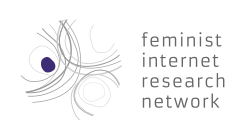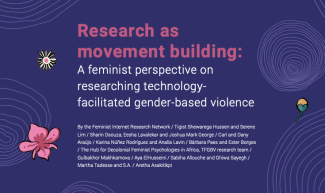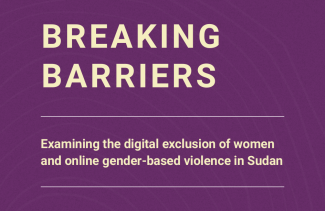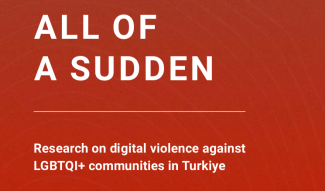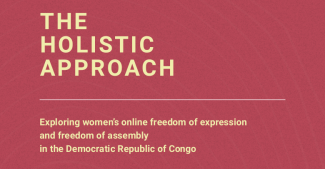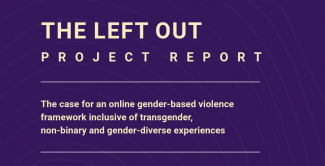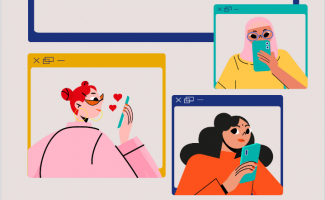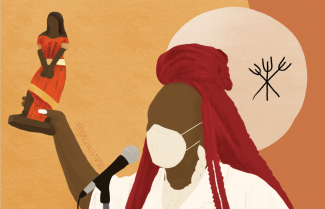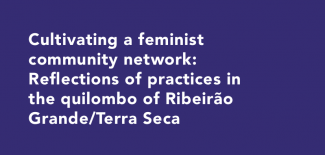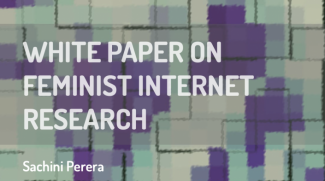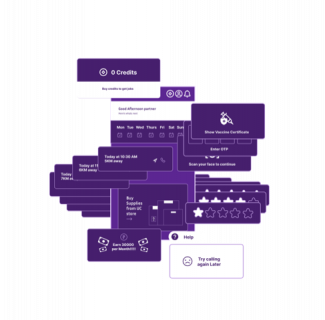Research
Newest update
This GenderIT edition by FIRN is a collection of 11 reflections and analytical essays by FIRN and FIRN’s research partners on what it means to do research at this critical juncture, while having to go through the unbearable pain of witnessing genocide, conflict and war, gross and persistent human rights violations, criminalisation of sex work and LGBTQIA+ communities and intensification of anti-gender mobilisation, as well as operating under spectacularly failed international law, solidarity and transnational feminist movements.
All research
In light of Sudan's volatile and conflict-affected political, economic, and social context, this study examines the barriers that hinder women from accessing the internet. In this research, we argue that women's access to the internet, freedom of expression, and active participation in technology are not limited to infrastructure issues, yet barriers include social, cultural, and political factors at both the national, and the international level.
Digital gender-based violence has been the topic of many studies in Türkiye, and yet only a few of those have evaluated the issue through a queer feminist perspective. The negative online experiences of LGBTQI+ are therefore often neglected. By uncovering these neglected experiences, the research explores the digital violence targeted against LGBTQI+ users. Through a mixed methodology, the study aims to understand the dynamics of digital gender-based violence. In a political context where laws act against gender equality and against the LGBTQI+ communities, the study offers possible strategies and recommendations to all the parties involved in the protection and prevention of digital violence including LGBTQI+ organisations, human rights organisations, the relevant digital platforms and the LGBTQI+ community as a whole.
The research sought to understand the inequalities and barriers to the enjoyment of freedom of expression and assembly online by women in Democratic Republic of Congo. The research assesses what fosters this inequality when women participate in freedom of expression (FoE) and freedom of association (FoA) on social media, how can we ensure that women can anticipate, prepare and respond to OGBV when exercising their rights on social media, and assessing what are the power dynamics of amplification and movement-building for women human rights defenders, activists, influencers and politicians on social media.This research is an effort to close the knowledge gap on Online Gender Based Violence (OGBV) by documenting experiences and responses to OGBV and further encourage women’s participation.
This research centres transgender, non-binary and gender-diverse (TNBGD) people’s experiences of online gender-based violence (OGBV) with the intention to challenge and reconceptualise current framings of OGBV. In order to do so, the research draws on experiences of TNBGD people living in Botswana, Rwanda, South Africa and Uganda. This research builds a broader, more inclusive and intersectional framing of OGBV to imagine better protections for TNBGD people who largely continue to be excluded in interventions and responses to OGBV.
This research intends to better understand the barriers and biases resulting from algorithms in women’s access to freedom of opinion and expression, and to examine women’s resiliency and how they navigate these algorithms that are inherently limiting to create the much-needed space for women and gender non-conforming persons to speak out, to be heard, and to, in effect, occupy digital spaces.
This paper looks at current struggles and transformations on the meanings of online violence in Brazil. It interrogates how feminist research and interventions in digital technologies with regards to online violence against LGTQIA+ in the contemporary political scenario. Responses to online hate speech as political violence shed new light on the intersections of gender, race, sexuality and gender expression at its basis.
This paper analyzes some developments of an action research project cultivated with the quilombolas residents from Ribeirão Grande/Terra Seca, which aimed at initiating a community network with an organization of women farmers to help foster their agroecological product sales. The essay begins contextualizing the quilombos, the actors involved in the project, as well as their political and methodological perspectives. Then it analyzes some positive and negative aspects of the project, and reflects on the importance of considering gender, race and colonialism as axes of oppressions present during community networks building. We share these reflections hoping that it can be useful for other community network activists, advocates and groups when it comes to their technological practices and methodologies in distinct territories.
The Feminist Internet Research Network (FIRN) and the Association for Progressive Communications (APC) Women’s Rights Programme’s knowledge building strategic team conducted a meta-research project that focused on the methodological processes and ethical practices of the eight research projects implemented as part of the FIRN project. Meta-research is the study of research, including its methods and how research is reported and evaluated, in order to understand and improve upon research and research processes.
As part of the Feminist Internet Research Network (FIRN) project, supported by the International Development Research Centre (IDRC), this white paper aims to assess feminist internet research in relation to internet governance and policy, with a particular focus on scholarship in the global South.
Platformization of domestic and personal services work has changed how tech forward, urban middle- and upper-class customers find workers, but it has changed little about the dynamic of the work being conducted. Continuing to use a feminist lens, we narrow our focus down to the app design and consider the interface and context of platfomised work.
We illuminate the values encoded in the interfaces created in platform-based domestic work, and highlight the power structures they uphold and break away from. The report is a result of our investigation at how workers navigate the rules and restrictions placed on them by the app's design and company policies. Using the Urban Company app as a case study, we show how platform design affects working conditions for workers.
